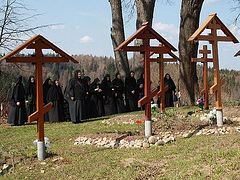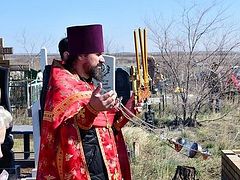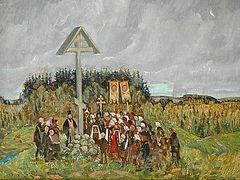Before I came to the faith, I didn’t like going to the cemetery. What’s more, the cemetery always reminded me of my mortality, and it made me sad. Since I didn’t see life as eternal, it seemed sad to live on earth.
What should I live for? In order to die? It’s all pointless. Willy-nilly you arrive at the idea of evolution here. Man appeared on earth as a result of positive mutations and eventually we began to have consciousness, conscience and reason. Sometimes you clutch your head, saying, “Why did I become a human being? Who needed all these mutations if I will just be buried in the ground or turn into a pathetic handful of ashes?” With such ideas, the old saying seemed justified: “Take everything from life before the worms eat you.”
The awareness of the fact that you are a mold from an eternal Image justifies your existence and gives it meaning. And the thought of your inevitable meeting with the Creator makes you take your life seriously. The purpose is revealed to you: He loves you, and you are a child of His love.
And you think: “How good!” It was only after I came to the faith that the cemetery ceased to be an eerie place for me and turned into a “repository of completed narratives.”
Our cemetery beyond the village in the heart of the forest is divided into the smaller, old one, which appeared in the seventeenth century, and the new and larger one. Do you know how our village cemetery differs from urban ones—apart from its size? I served the funeral for almost everyone who is buried in the new cemetery. I made the “last entry” in the destiny of almost every person buried here. I pray for them and remember many of them. Besides, even before my ordination I had lived and worked with these people for many years. And I know that their life in eternity depends on my prayer in some way. Our bond with them was not severed by their demise. Spiritual care does not stop even beyond the grave.
The Church year, with its memorial Ancestors’ Saturdays and especially the Paschal services, does not allow us to forget those who have already departed this life. And visiting people’s graves on Radonitsa always is always a special, joyful event for me. I go to the cemetery as if to visit my friends—those whom I came to love during their earthly lives and with whom I prayed and restored the church—my brothers and sisters.
One day I had a dream just before going to serve on Ancestors’ Saturday. It was as if I had died, my soul had flown away, and I could even see my own body from outside it. And I was so upset and sorry that I could not say goodbye to anyone, hug my children and kiss my wife. And my soul began to cry from anguish.
Suddenly a thought flashed through my mind: “Today is Ancestors’ Saturday! How many people will come to church now, but there will be no service! Where will another priest come from?” And my soul, accustomed to responsibility, immediately returned to my body. I woke up and was relieved that it had all just been a dream. But then I remembered forever how my soul had wept after leaving the body. From that day on I began to feel compassion for the deceased while performing the funeral over them.
 I am greeted first by Alexei at the entrance to the new cemetery. I learned a lot from that man and in many ways, would like to be like him. He knew how to live and had a great desire to live. But for all his buoyancy, illness taught Alexei to be patient and to humble himself. He was dying for several years, but every time after the unction he got better and continued to come to church every Sunday and receive Communion. And he passed away on the feast of the Ascension of the Lord.
I am greeted first by Alexei at the entrance to the new cemetery. I learned a lot from that man and in many ways, would like to be like him. He knew how to live and had a great desire to live. But for all his buoyancy, illness taught Alexei to be patient and to humble himself. He was dying for several years, but every time after the unction he got better and continued to come to church every Sunday and receive Communion. And he passed away on the feast of the Ascension of the Lord.
The last thing Alexei said to me—and I managed to give him Communion—was:
“Thank you, Father. Thanks for everything!”
Christ is Risen, Alexei!
The well-groomed grave of the child Sashenka [a diminutive form of the name Alexander.—Trans.] is very close. He received Communion almost at every Sunday Liturgy. He drowned in Feodosia1 the day before he was supposed to start going to the first grade. His father Nikolai, a simple worker, could not save the child. After that, through hard labor he earned a sufficient sum of money for us to pay for the work of icon-painters. Three large icons of the Deesis in the St. Nicholas Chapel of our church are his sacrifice in memory of his son.
One day, after his death, the boy came to his father in a dream and said:
“Papa, I’ve been to many places, but I like St. Alexander Svirsky’s monastery the most.”
Christ is Risen, dear child! Pray for us there.
Irina. Irochka, I still can’t come to terms with the fact that you’ve been here for six years already. You shouldn’t have died, especially at such a young age. You are our beauty! I will never forget it—after I had given you Divine Unction and Communion, you took my hand in yours, already translucent from illness, and, kissing it, said:
“Now I’m not afraid of anything. Thank you.”
I hope you were not offended that I almost forced your husband away from your grave. You know, I started to fear for him. The dead cling to the dead, and the living cling to the living, as it were. Christ is Risen, our joy!
* * *
Sophia, I’ll tell you honestly: no one bakes pancakes the way you baked them. Do you think I’m joking? No, in all seriousness. The schoolchildren who cleaned the church with us and then ate your pancakes with tea have already grown up. Now some of them have their own children, but every time they come, they recall how much they enjoyed your delicious pancakes!
 What hard times we had! Now we have both a refectory and a parish house (with two floors), but back then we didn’t have anything. I still wonder how you always managed to cope with everything. Christ is Risen, our wise woman!
What hard times we had! Now we have both a refectory and a parish house (with two floors), but back then we didn’t have anything. I still wonder how you always managed to cope with everything. Christ is Risen, our wise woman!
Praskovyushka [a diminutive form of the name Parasceva.—Trans.]! My angel who selflessly helped me in the altar. Today is Radonitsa and the eighth anniversary of your birth into eternity. You read by syllables, but you taught me so much! My friend, I am grateful to God that He brought me together with you.
Pray for me, mother, so that someday I too can reach the measure of your simplicity and learn to hope and trust in God the way you did. Of course, you know that your youngest daughter gave up drinking and came to the church, that she prays and often takes Communion. Today she is almost never out of the church, as was the case with you. So, both your daughters are in the church.
Your prayer does its job, and even after your death it does not lose its power. You cried your eyes out for your daughter. The time came, and she told me herself, “That’s it, Father, there there’s no turning back.” What a wise woman you are! Praskovyushka, Christ is Risen!
And here rests my old acquaintance, Vasily Ivanovich. In his old age a strange thing happened to him: he fell in love like a teenager. He started writing love poetry, but he was ashamed to reveal it to anyone. But he trusted me. He would come to the entrance of my house, sit down on a bench and wait for me to see him and come out. Then he would take out his notebook, and his “sonnets” would start flowing. How many times I invited you to the church, my friend! You kept promising, but... never came. Christ is Risen, Vasily!
Then the tombstones of rich people begin. There are three tombstones here, behind an imposing metal fence. That’s right, it’s a family of three people. Petrovich, an entrepreneur, a good man who drank. He didn’t give sufficient attention to his son who was hooked on drugs. No matter how much they tried to cure him it was all in vain. After the young man’s death, Petrovich’s wife took to drinking too, as if she had decided to die. They lived beside the church. Their house had once been built on church land. It was a big, beautiful “mansion” in which you could live for many years.
One day Petrovich came to our church while I was racking my brains over the problem of where to find money for a new roof. I desperately needed to have our winter church reroofed. A piece broke off from the destroyed bell-tower and pierced the roof in several places. And we had just plastered the walls inside, putting so much effort into it.
There was no one in the church except Petrovich and me. I went up to him and greeted him. I saw that he was having a very hard time. And who would be feeling otherwise after losing his only son? I addressed him:
“Petrovich, do a good deed in memory of Kostya [a diminutive form of the name Konstantin.—Trans.]. Do you see how the roof was broken by bricks from the bell-tower? Help us redo it as long as there is no rain so far. You’re a wealthy man, help me. I will also ask the parishioners—and we will do it all together. I’m afraid we’ll ruin the plaster inside after the rain starts.”
Petrovich was silent for a little while. His face was so kind, he really was a nice chap. Then he said:
“You know, father, I’ve been thinking about how I’m going to live now, after my only son’s death. And I’ve decided that now I will live only for myself. So, please don’t take it amiss, but look for other sponsors.”
And indeed, Petrovich started to live for himself: he bought a new car, had a holiday abroad, and began to dress well. And then Petrovich disappeared—we couldn’t find him for a whole week. One afternoon as I was walking to the church, a boy of about ten caught up with me:
“Father, go and see what it is! I keep looking and I can’t figure it out.”
I went with him, and he brought me to the back of Petrovich’s house, where there was a huge puddle. I looked where the boy was pointing and saw something like a swollen sugar bag floating in the puddle. But it didn’t seem to be a bag—it resembled a man. We called the police, and Petrovich’s daughter-in-law pulled him out of the puddle.
She said she saw a bullet hole in his forehead. But no one investigated it then.
I performed the funeral for him in the courtyard of our church. And three months later his wife passed away. Their “big mansion” stands empty.
Christ is risen, Petrovich! Don’t think that I bear a grudge against you. After you refused, another man came and offered his help—he took the church reroofing on himself. This is how things work with God—if not you, then someone else. You already know that. Poor Petrovich, nobody remembers you, but I don’t forget you.
How many years have I served at the grave of a young mother’s child on Radonitsa. She crossed a pedestrian crossing in Moscow when the traffic light was green. But a jeep suddenly appeared, knocking the child down. There must have been a tiny news report about you that day. As I understand it, the jeep driver was acquitted. But it doesn’t matter now whether he was acquitted or not. A momentary incident, but the mother’s mental distress has not abated for four years, she is sick at heart, and she still wears black.
How accustomed we are to these news reports: Someone has perished here, someone else has been killed in an explosion there, a plane crashed somewhere, etc. But all this means someone’s pain, tears, broken hearts, and orphaned children.
Mother, Christ is risen, don’t cry and start praying for your girl. Help her, while you have some strength.
There is a large marble slab with a portrait of a young man. Yuri worked at one of his father’s gas stations. About ten years ago, some drug addicts murdered him at work at night. I remember his mother weeping in church. We have a custom: If people make a contribution to the church in memory of their reposed loved one, order an icon, buy a candle stand or something like that, then we add the name of the person in question into our list for permanent commemoration.
I offered the same to Yuri’s close ones. On hearing this, his mother stopped crying. She came up to me and said quietly:
“Father, only don’t tell my husband. I’m afraid he won’t understand you.”
It was only then that it dawned on me: If he left his son alone to work at the gas station at night without security, he really wouldn’t understand me. His family does not set foot in church anymore.
Yuri, your closest ones betrayed you. But forgive them; You know, we don’t choose our parents. But I’m still wondering: How will they look into your eyes when you meet them in eternity?
Nobody comes to your grave on Radonitsa, but I remember you, your placidness, and sometimes pray for you. But forget them all. Christ is Risen, Yuri—you and I will rejoice together.
At the exit I met one of our believers from Moscow, who had buried her mother right around Pascha a year before.
“Earlier I couldn’t go to the cemetery—I felt uneasy here. But now I can sit here next to my mother’s grave, talk to her, and I feel so good—I don’t want to go away,” she said.
And we, Galochka, don’t “go away”. It only seems to us that the departed are somewhere far away from us, but in reality they are close, in our hearts, in our memory and our prayers. After all, and of course, you know it yourself, love (if we have it) does not disappear, even after death.






